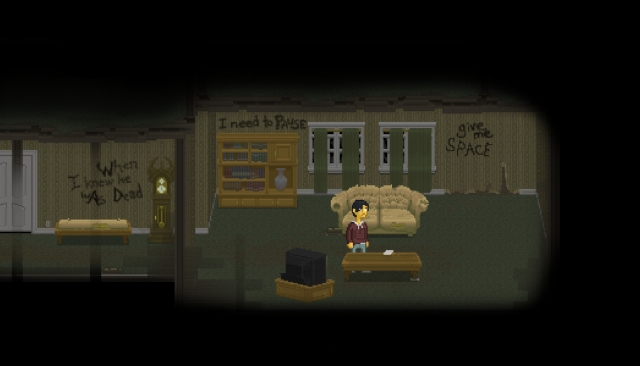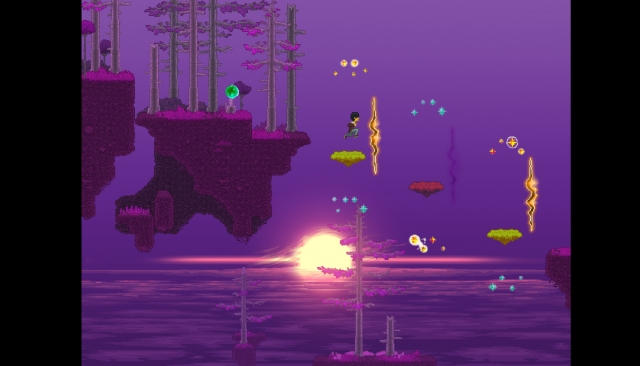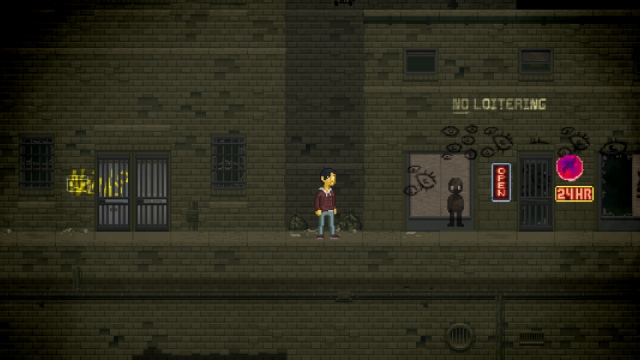
Disorder Review
Think ‘platformer’, and more likely than not you’ll picture brightly coloured levels with anthropomorphised creatures or bizarrely athletic plumbers. When it comes to the act of jumping from platform to platform, depression and madness isn’t really the associated theme that springs to mind. Yet here we have Disorder, a very traditional platform title in some respects, but rather unique in others. The basic gameplay of Disorder is instantly familiar and classic platformer territory, but an underlying story and overall tone focused on the concept of madness, and the battle between hope and despair, stands the game out from the ever-increasing titles within the genre. Although to say that this divergence from the norm makes the game better on the whole would be an exaggeration.
In terms of gameplay, Disorder truly is a traditional platformer in every sense of the term - you will be using a lot of platforms during your play time. The core concept is a world-switching mechanic that allows the player to instantly flick between two different versions of the game world. Each world has a slightly different layout, so navigating levels requires that you alternate between the two regularly in combination with the good ol’ fashioned jump button (as well as crouch, that’s pretty much your bag in terms of controls). So a wall that is impassable in one world is invisible in the other, meaning you can just waltz on by with a quick tap of a button.

Of course, it all gets a bit more complicated than that. Switching between worlds also moves certain platforms in differing directions, death-causing obstacles appear and disappear and shooting devices change their trajectory. There are a few other nuances that you should discover for yourself, but rest assured that they’re all well integrated, fun to play around with, and always fair. As a whole the mechanic is used excellently, making the gameplay thoroughly enjoyable. It doesn’t really matter that this sort of thing has been done plenty of times before, what matters is that it is executed well. On this front, Disorder excels.
Small, but important, extras also keep the gameplay fun. Regular checkpoints placed in well-thought-out locations make the game a lot less frustrating than it otherwise could have been. Dying is a fairly regular feature in Disorder, as much of the game requires a deal of trial and error, but the consistent checkpointing and quick reload after death make this relatively painless so long as you’ve got the patience to work through the physical puzzles that are presented. Those who are familiar with the genre will be right at home, but if you’re not accustomed to the style, then this isn’t the place to start. Disorder isn’t a difficult game, but it does require patience and the ability to plan logically.

While the gameplay is certainly solid, it’s the theme, visuals and promise of an atypical story that are likely to attract most players to Disorder. There’s no doubt that the game is visually stimulating; the pixelated style and colourful landscapes make it an enjoyable game to traverse, although that same art style does restrict the ability for the player to truly connect with the world and its inhabitant. Indeed, the protagonist isn’t the most enjoyable character, and a lack of facial animation and detail make it difficult to feel true empathy for his sorry state.
It’s an issue compounded by some rather hit-and-miss writing that often proves to be a little too ambiguous. It’s easy to see that the player character is in pain and to understand why, but the exploration of this depression is a tad too philosophical. It avoids reality, and comparisons to real, direct emotion, to its detriment. Compared with the work of say, Will O’Neil, who goes to great lengths to explain the deep roots behind depression, the writing in Disorder is a tad dramatised, to the point where you could envision it being concocted for a GCSE drama performance. This doesn’t prevent Disorder from telling an interesting story, but more thorough, relatable examples of this theme can be found elsewhere.

It doesn’t help that the text is often just littered around the landscape, forcing the player to lose their momentum and catch up with the story mid-game. In reality, this is just one example of the conflict between story, theme and gameplay. It’s very easy to forget about the sad tale of loss and paranoia when most of your time will be spent hopping from platform to platform, or avoiding things that shoot you. The gameplay is so frivolous (in a good way, mind you) that it doesn’t pair up with the dark theme especially well. It’s hard to feel for the protagonist when he’s talking about death and despair one minute, then jumping between tree branches the next. It just doesn’t quite match.
It’s still possible to enjoy the exploration within Disorder, and some players (with a good ability to suspend disbelief) probably won’t find this to be an issue. A fantastic soundtrack does help strengthen the connection between the two parts of the game, as does the care taken to enrich the whole title in thematic detail (even the pause menu, for instance, dabbles in concepts of madness). Yet these don’t prevent the game from feeling like two very different experiences that have been welded together with a candle. As a more simplistic critique, it’s also a little on the short side given the asking price. It prevents the game from wearing thin, but it’s difficult to shake the feeling that more could have been done with the enjoyable mechanics. Disorder is a good game that’s worth picking up when a sale comes around, just don’t expect to have your thoughts on madness and depression challenged significantly.
Disorder (Reviewed on Windows)
Game is enjoyable, outweighing the issues there may be.
Disorder is a good game that’s worth picking up when a sale comes around, just don’t expect to have your thoughts on madness and depression challenged significantly.









COMMENTS